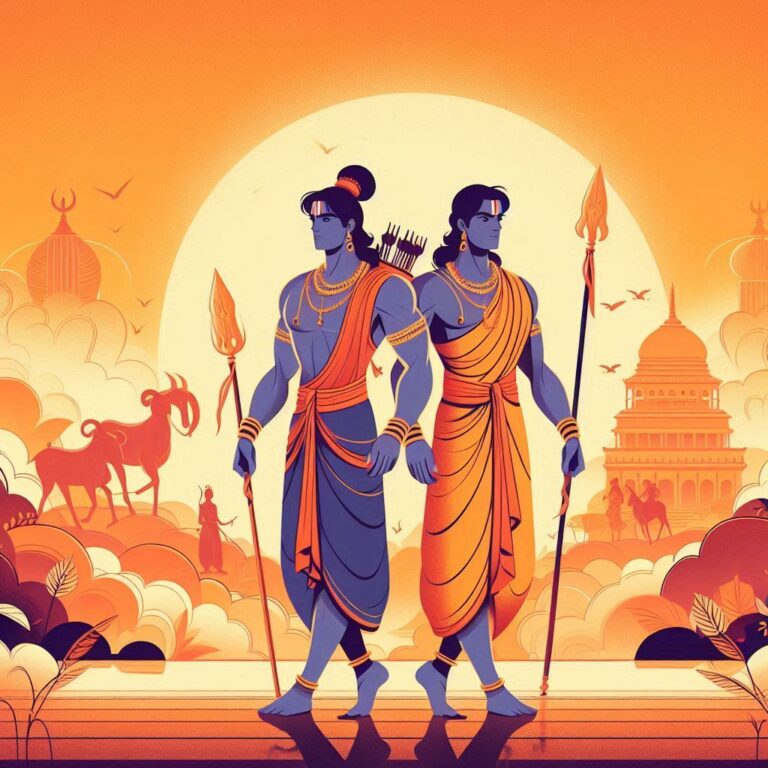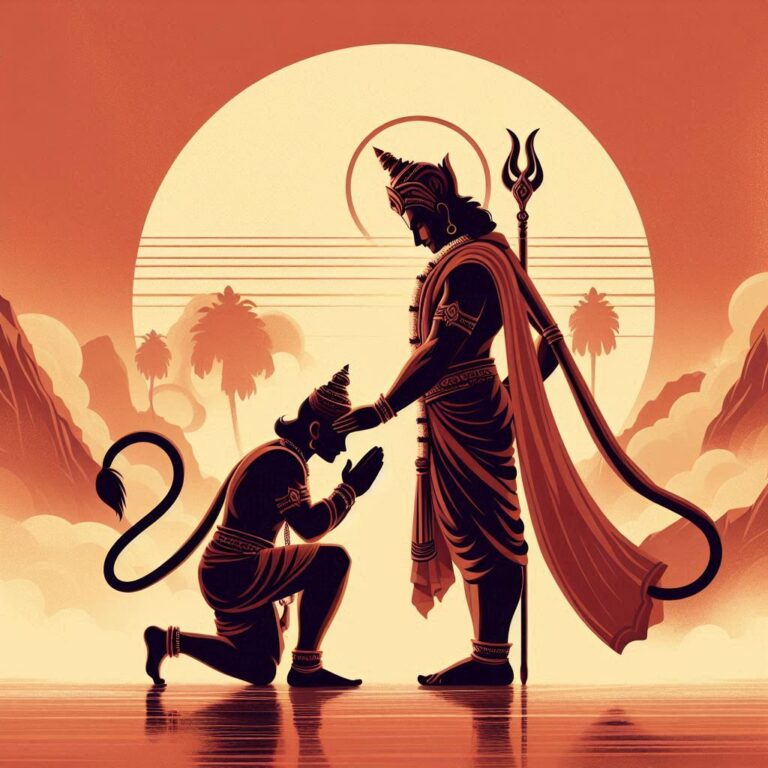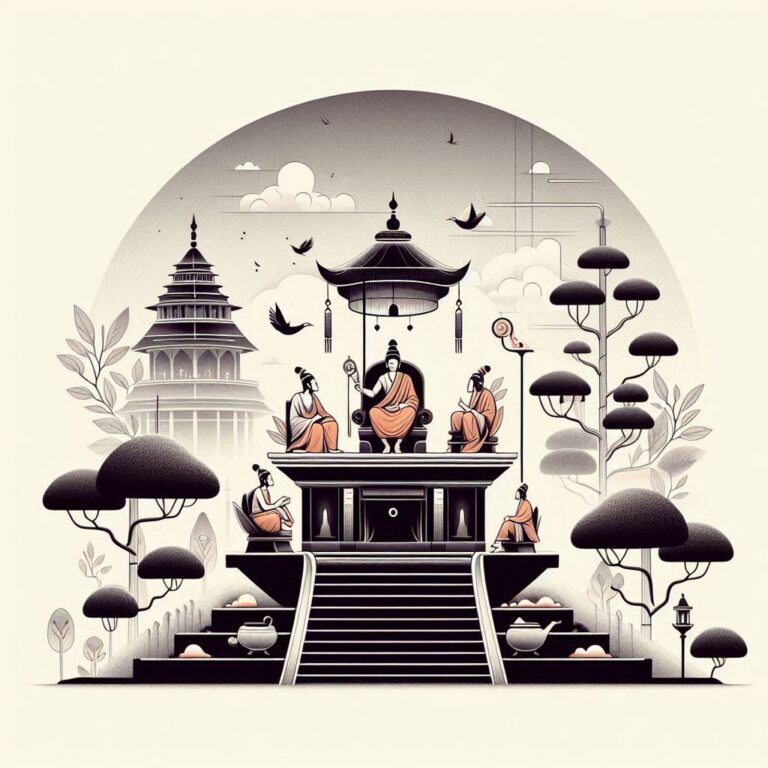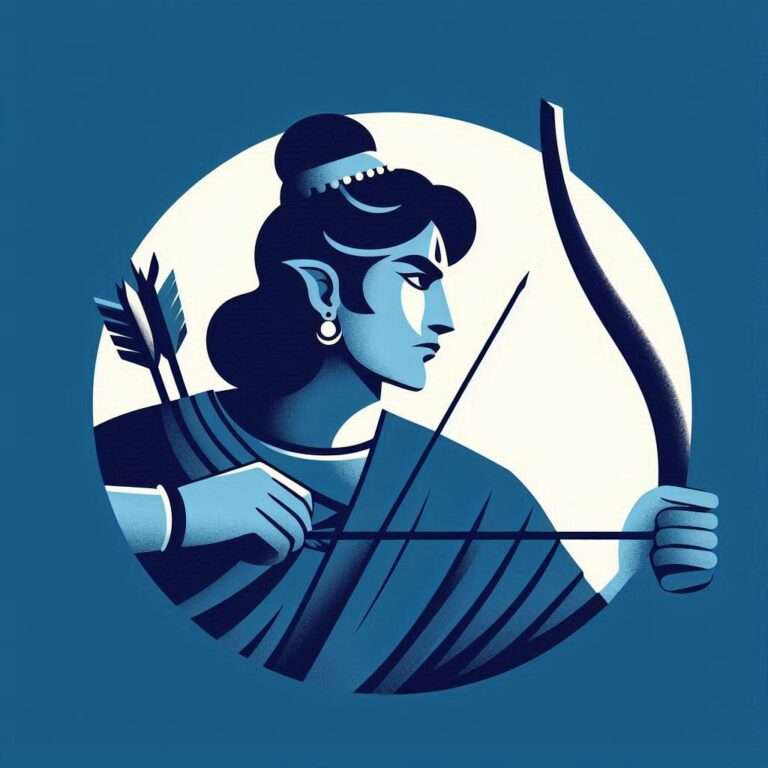Ravana: A Demon’s Divine Birth
Ravana, one of the most formidable figures in Hindu mythology, is often remembered as the ten-headed demon king who kidnapped Sita, leading to the epic battle between good and evil in the Ramayan. But beneath this fearsome exterior lies a story of divine origins, unmatched intellect, and a paradoxical nature that continues to fascinate scholars and devotees alike. How could someone born of divine lineage embody such a potent mix of brilliance and malevolence? This article delves deep into the divine birth of Ravana and the complex tapestry of his existence.
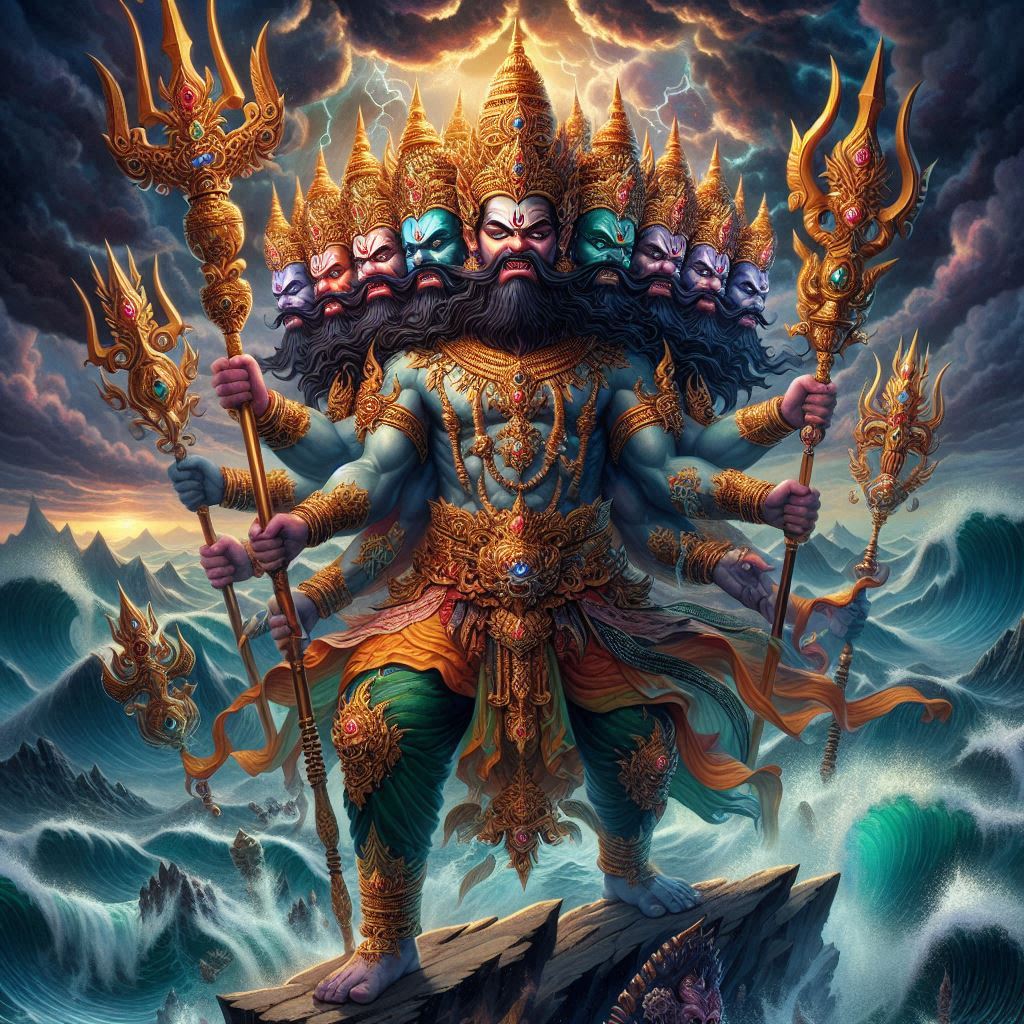
The Divine Lineage of Ravana
Ravana’s story begins with the union of Vishrava, a sage of great repute, and Kaikesi, the daughter of a demon king. Vishrava was the son of Pulastya, one of the ten Prajapatis and a mind-born son of Brahma, making Ravana’s lineage inherently divine. Kaikesi, driven by a prophecy that her children would dominate the three worlds, sought Vishrava as her husband. Their union bore Ravana, Kumbhakarna, Vibhishana, and a sister, Shurpanakha.
श्लोकः:
“पुलस्त्यस्य सुता देवी, कैकेसी नाम जाह्नवी।
तस्यां जायते रावणः, कुम्भकर्णः च भीषणः॥”
Phonetics:
“Pulastyasya sutā devī, Kaikesī nāma jāhnavī।
Tasyāṁ jāyate Rāvaṇaḥ, Kumbhakarṇaḥ ca bhīṣaṇaḥ॥”
Translation:
“From Pulastya’s lineage came Kaikesi, the daughter of Jahnu.
To her were born Ravana, Kumbhakarna, and the fearsome Vibhishana.”
This divine connection to sages and demons encapsulates the duality present in Ravana’s character. He was not merely a demon; his bloodline was a potent mix of celestial wisdom and demonic ambition.
The Prophecy of Ravana’s Birth
Ravana’s birth was not an ordinary event; it was foretold by the gods and awaited by the demons. The prophecy that surrounded his birth spoke of a being who would challenge the gods themselves. The cosmic balance demanded the birth of a mighty demon who would embody the darkest aspects of power and intellect.
श्लोकः:
“दैत्योऽयमद्भुतः शूरः, शप्तो देवैः कदाचन।
जन्मना राक्षसो भूत्वा, स कालान्तककारकः॥”
Phonetics:
“Daityo’yam adbhutaḥ śūraḥ, śapto devaiḥ kadācana।
Janmanā rākṣaso bhūtvā, sa kālāntaka kārakaḥ॥”
Translation:
“This demon, mighty and extraordinary, once cursed by the gods,
Would be born as a Rakshasa, the harbinger of doom.”
This prophecy was both a blessing and a curse, as it foreshadowed the greatness of Ravana but also his inevitable downfall.
The Birth of Ravana: A Celestial Event
Ravana’s birth was accompanied by celestial phenomena that heralded the arrival of a being of immense power. It is said that the heavens trembled, and ominous signs were seen across the skies. The gods, aware of the prophecy, watched with bated breath as the child, destined to be both a conqueror and a tyrant, was born.
श्लोकः:
“जायमानस्य रावणस्य, द्यौः पृथिवी च ससंप्लवे।
चिच्च्छेद गिरयो सर्वे, विकम्पित जगत्त्रयम्॥”
Phonetics:
“Jāyamānasya Rāvaṇasya, dyauḥ pṛthivī ca sasaṁplave।
Ciccheda girayo sarve, vikampita jagattrayam॥”
Translation:
“At Ravana’s birth, the heavens and earth shook,
Mountains quivered, and the three worlds trembled.”
This celestial event marked the beginning of an era where Ravana would rise to power, challenging the very fabric of the universe.
Ravana’s Childhood: A Prodigy in the Making
Even as a child, Ravana exhibited signs of extraordinary intelligence and strength. His thirst for knowledge was insatiable, and he mastered the Vedas and Shastras at a young age. Under the guidance of his father, Vishrava, Ravana developed his intellectual and spiritual faculties, laying the foundation for his future conquests.
श्लोकः:
“बाल्येऽपि विद्वान् संपूर्णः, श्रुति-स्मृति-पुराणवित्।
रावणः सर्वविज्ञानं, यथा कालं समभ्यसत्॥”
Phonetics:
“Bālye’pi vidvān saṁpūrṇaḥ, śruti-smṛti-purāṇavit।
Rāvaṇaḥ sarvavijñānaṁ, yathā kālaṁ samabhyasat॥”
Translation:
“Even in childhood, Ravana was a learned scholar,
Master of Vedas, Smritis, and Puranas, he practiced all sciences timely.”
This period of learning and growth prepared Ravana for his eventual rise as a ruler, one who would command not just physical might but also profound wisdom.
The Ascent of Ravana: From Prodigy to Tyrant
Ravana’s transformation from a prodigious child to a tyrant ruler was marked by a series of conquests that solidified his power across the three worlds. As Ravana grew older, his ambitions expanded beyond the realms of knowledge. He sought to conquer not only the earth but also the heavens and the netherworld. His ascension was marked by battles against the gods, demons, and mortals alike, earning him the title of Lankeshwara, the King of Lanka.
श्लोकः:
“बलादाक्रम्य लोकेषु, त्रैलोक्यं स नराधिपः।
रावणो राज्यमारूढः, लंकेशोऽभूद्विजेयः॥”
Phonetics:
“Balādākramya lokeṣu, trailokyaṁ sa narādhipaḥ।
Rāvaṇo rājyamārūḍhaḥ, laṅkeśo’bhūdvijeyaḥ॥”
Translation:
“By force, he conquered the worlds,
Ravana ascended the throne, becoming the invincible King of Lanka.”
Ravana’s reign was characterized by his unyielding desire to dominate, which eventually led to his tyrannical rule. He subjugated the gods, forcing them to bow before him, and demanded that all creatures acknowledge his supremacy.
Ravana’s Devotion to Shiva
Despite his demonic tendencies, Ravana was an ardent devotee of Lord Shiva. His devotion to Shiva was so profound that he performed severe penance to please the deity. Ravana’s most famous act of devotion was when he attempted to lift Mount Kailash, Shiva’s abode, to bring it to Lanka. Impressed by his dedication, Shiva granted Ravana the Atmalinga, a powerful symbol of Shiva’s essence.
श्लोकः:
“कैलासोद्धरणे यत्नं, रावणः क्रियमाणकः।
तुष्टो हरः प्रदायात्म, लिङ्गं तस्मै महात्मने॥”
Phonetics:
“Kailāsoddharaṇe yatnaṁ, Rāvaṇaḥ kriyamāṇakaḥ।
Tuṣṭo Haraḥ pradāyātma, liṅgaṁ tasmai mahātmanе॥”
Translation:
“In his effort to lift Kailasa, Ravana showed great determination,
Pleased, Shiva granted the Atmalinga to the great soul.”
This act of devotion added to the complexity of Ravana’s character, as it showcased his ability to blend deep spirituality with his otherwise fearsome persona.
Ravana: A Scholar and a Warrior
Ravana was not just a warrior; he was also a scholar of unparalleled wisdom. He was well-versed in the Vedas, Shastras, and various forms of art and music. His scholarly pursuits were as intense as his military campaigns, making him a well-rounded figure with a deep understanding of both worldly and spiritual matters.
श्लोकः:
“सर्वशास्त्रार्थतत्त्वज्ञः, कविः काव्यविचक्षणः।
रावणोऽभूद्विज्ञानं, योद्धा च समरे प्रभुः॥”
Phonetics:
“Sarvaśāstrārthatatvajñaḥ, kaviḥ kāvyavicakṣaṇaḥ।
Rāvaṇo’bhūdvijñānaṁ, yoddhā ca samare prabhuḥ॥”
Translation:
“A master of all scriptures, a poet skilled in verse,
Ravana possessed great wisdom and was a formidable warrior in battle.”
This duality of being both a scholar and a warrior further deepens the intrigue surrounding Ravana’s character, as it shows his ability to excel in multiple fields simultaneously.
Ravana’s Boon: The Source of His Power
One of the key elements that contributed to Ravana’s might was the boon he received from Brahma. After performing intense penance, Ravana was granted the boon of near invincibility, with the condition that he could not be killed by gods, demons, or spirits. This boon made Ravana almost unbeatable, allowing him to dominate the three worlds without fear of defeat.
श्लोकः:
“अवध्यो देवदानवैरिति, ब्रह्मणो वरम्।
रावणः कृतवान् तप्तं, तपसः फलमुत्तमम्॥”
Phonetics:
“Avadhyo devadānavairiti, brahmaṇo varam।
Rāvaṇaḥ kṛtavān taptaṁ, tapasaḥ phalamuttamam॥”
Translation:
“Unkillable by gods and demons alike, was the boon from Brahma,
Ravana’s penance bore fruit, granting him the ultimate reward.”
This boon, however, also sowed the seeds of his downfall, as it led to his arrogance and eventual clash with Lord Rama, who, being human, was not bound by the conditions of the boon.
The Curse of Ravana: Foretelling His Downfall
While Ravana’s power was unmatched, he was not without his flaws. His arrogance and overconfidence led him to disrespect many sages and deities, resulting in a series of curses that foretold his eventual demise. One such curse was from Nandi, the bull of Shiva, who cursed Ravana that his kingdom would one day be destroyed by monkeys.
श्लोकः:
“नन्दीश्वरेण शप्तोऽसौ, रावणः कृतपाप्मना।
वानरैस्तु विनाशं स्यात्, लङ्कायाः सिंहनादिनः॥”
Phonetics:
“Nandīśvareṇa śapto’sau, Rāvaṇaḥ kṛtapāpmana।
Vānarai stu vināśaṁ syāt, laṅkāyāḥ siṁhanādinaḥ॥”
Translation:
“Cursed by Nandi for his sin, Ravana,
Shall face destruction by monkeys, with the roar of a lion.”
These curses added a layer of tragic inevitability to Ravana’s story, as they hinted at the downfall that would eventually come despite his immense power.
Ravana’s Role in the Cosmic Play
In the grand scheme of the Ramayan, Ravana was not merely a villain but an essential part of the cosmic order. His role as the antagonist was crucial in allowing the forces of dharma, embodied by Lord Rama, to triumph over adharma. Ravana’s life and actions served as a catalyst for the unfolding of divine events that would restore balance in the world.
श्लोकः:
“धर्माधर्मयुगे घोरं, रावणोऽभूत्संप्रभवः।
तस्मिन् काले विनाशाय, रामस्योद्भव उच्यते॥”
Phonetics:
“Dharmādharma yuge ghoraṁ, Rāvaṇo’bhūtsaṁprabhavaḥ।
Tasminkāle vināśāya, Rāmasyodbhava ucyate॥”
Translation:
“In the age of dharma and adharma, arose the fearsome Ravana,
His destruction was destined by the birth of Rama.”
This perspective shifts the view of Ravana from a mere villain to a complex character who was necessary for the cosmic balance to be restored.
The Paradox of Ravana: Divine Yet Demonic
Ravana’s character is a paradox, blending the divine with the demonic. His birth, knowledge, and devotion place him among the most revered figures in Hindu mythology, yet his actions and arrogance align him with the forces of darkness. This duality is what makes Ravana a figure of fascination, embodying the complexity of human nature itself.
श्लोकः:
“दैवमासुरयोः सृष्टिः, रावणः सम्प्रवर्तकः।
देवत्वं चासुरत्वं च, यत्रासीत् तत्रैव सः॥”
Phonetics:
“Daivamāsurayoḥ sṛṣṭiḥ, Rāvaṇaḥ sampravartakaḥ।
Devatvaṁ cāsuratvaṁ ca, yatrāsīt tatraiva saḥ॥”
Translation:
“Created from divine and demonic forces, was Ravana,
Where divinity and demonhood met, there he stood.”
This shloka captures the essence of Ravana’s existence—a being born of both light and darkness, whose life was a testament to the intricate dance of opposing forces.
Ravana’s Legacy in Hindu Mythology
Ravana’s legacy is a complex one. In some regions, he is venerated as a great scholar and a devout follower of Shiva, while in others, he is seen as the epitome of evil. His life offers numerous lessons, from the dangers of unchecked ambition to the importance of humility and respect for the divine order.
श्लोकः:
“रावणस्य कथा लोके, विविधा परिभाषिता।
साधुर्वा पापकर्मा वा, तद्वृत्तिः सदा स्मृता॥”
Phonetics:
“Rāvaṇasya kathā loke, vividhā paribhāṣitā।
Sādhurvā pāpakarmā vā, tadvṛttiḥ sadā smṛtā॥”
Translation:
“The tale of Ravana is told in many ways across the world,
Whether as a saint or a sinner, his deeds are always remembered.”
This dual perception of Ravana highlights the complexity of his character and the lasting impact he has had on Hindu mythology.
Modern Interpretations of Ravana
In contemporary culture, Ravana is often reinterpreted in various ways. Some view him as a tragic hero, while others see him as a symbol of resistance against authority. His story is revisited in literature, theater, and films, offering new perspectives on his life and actions. These modern interpretations continue to keep Ravana’s legacy alive, making him a timeless figure in the cultural consciousness.
श्लोकः:
“अद्यापि जनसंवेदे, रावणः पौरुषो महान्।
कालेनातिप्रवर्तमाने, नित्यं च स्मरणीयः॥”
Phonetics:
“Adyāpi janasaṁvede, Rāvaṇaḥ pauruṣo mahān।
Kālenātivartamāne, nityaṁ ca smaraṇīyaḥ॥”
Translation:
“Even today, in the hearts of people, Ravana’s might is great,
As time progresses, he remains ever memorable.”
This shloka emphasizes the enduring relevance of Ravana in modern times, as his story continues to resonate with people across generations.
Conclusion
Ravana’s birth and life are a testament to the complex interplay of divine and demonic forces. His story is not just one of villainy but of a profound character who embodied both light and darkness. Understanding Ravana requires looking beyond his actions in the Ramayan to appreciate the depth of his intellect, devotion, and the cosmic role he played. His legacy, filled with lessons and paradoxes, remains a significant part of Hindu mythology and continues to be explored in various cultural contexts.
FAQs
- Was Ravana purely evil?
No, Ravana was a complex character with both divine and demonic traits. While his actions in the Ramayan portray him as a villain, he was also a devout follower of Shiva and a learned scholar. - Why did Ravana abduct Sita?
Ravana abducted Sita to avenge the humiliation of his sister Shurpanakha by Rama and Lakshmana. His actions were driven by both personal vendetta and his desire to challenge the might of Rama. - What were the curses that led to Ravana’s downfall?
Ravana received several curses throughout his life, including a curse from Nandi that his kingdom would be destroyed by monkeys and another from a Brahmin that his death would come from a human. - Is Ravana worshipped in some parts of India?
Yes, in certain regions, such as parts of Tamil Nadu and Karnataka, Ravana is venerated for his devotion to Shiva and his scholarly achievements. - What is the significance of Ravana’s ten heads?
Ravana’s ten heads symbolize his vast knowledge and his mastery over the six shastras and four Vedas. They also represent the ten qualities of human nature that he possessed.

